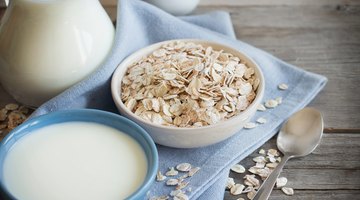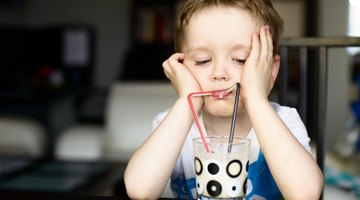Risk of Toddler Drinking Too Much Milk
While milk can be a great way to provide your toddler the calcium he needs, drinking too much can also pose a danger, especially if he cannot handle the lactose or proteins in milk. And even if your child can down multiple glasses without experiencing any digestive problems, you may need to limit his consumption if he drinks more than 24 ounces a day on a regular basis.
Iron Deficiency Anemia
Iron deficiency anemia is the main concern for most toddlers who drink lots of milk. Milk is low in iron and it inhibits the absorption of iron in the body, so young children who drink a lot of it may become iron deficient. Toddlers are especially vulnerable because they may not have a diet otherwise high in iron, so they can't make up for the lack in other ways. Also, because a toddler's digestive tract is still developing, he may develop a mild reaction to milk that causes small amounts of blood loss in the intestines. Blood loss reduces the iron in the body, so this can make the likelihood of iron deficiency anemia even greater.
Excess Calories but Missing Nutrition
Non-Dairy Diet for Toddlers
Learn More
A toddler who drinks too much milk may be getting plenty of calcium, but she probably is eschewing other foods and drinks that have high levels of other nutrients. If your child drinks more than three cups of milk a day, she may be getting half, or more, of her daily calorie intake from milk alone. If your child's family history includes obesity, heart disease or diabetes, your pediatrician may recommend limiting milk intake or switching to low-fat milk.
Lactose Intolerance and Allergies
Some toddlers have milk allergies, in which case even a few sips may be too much. Children with a severe allergy may develop wheezing, vomiting or hives if they drink milk. Sometimes, a milk allergy can be life threatening. Most children with a milk allergy outgrow it by age two or three, so you may try reintroducing milk later if your child has exhibited an allergic reaction to milk.
Unlike a milk allergy, lactose intolerance isn't dangerous, but it can be uncomfortable. Lactose intolerance occurs when the body slowly stops producing lactase, the enzyme that digests the sugar in milk. Lactose intolerance in babies is rare because they need lactase to digest their mother's milk, but the ability to produce lactase can start to diminish during toddler-hood. A lactose-intolerant toddler may develop an upset stomach or diarrhea if she drinks too much milk. The amount of milk a toddler can handle depends on how much lactase she still produces, so each child has a different limit.
How Much to Drink?
How to Transition From Formula to Milk
Learn More
According to the Centers for Disease Control and Prevention, children between the ages of one and five should consume no more than three eight-ounce glasses of milk per day. Drinking about one-and-a-half cups of milk per day is enough to meet the calcium needs of children between ages one and three, the time most typically considered toddler-hood. Babies under the age of one should not have any cow milk at all, even if they have begun walking and are referred to as toddlers. Unless your doctor recommends otherwise, your toddler should only drink whole milk until age two, because children between one and two need the fat in milk to support their rapid brain development. Skim milk and low-fat milk do not supply enough fat.







